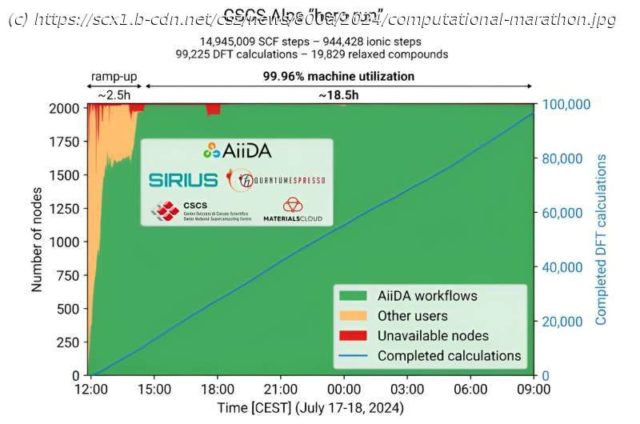It took about 20 hours and a lot of coffee for a team of scientists from the Swiss National Center of Competence in Research NCCR MARVEL to complete a computational marathon that showcased both the power of Switzerland’s .
It took about 20 hours and a lot of coffee for a team of scientists from the Swiss National Center of Competence in Research NCCR MARVEL to complete a computational marathon that showcased both the power of Switzerland’s main supercomputing facility, and the level of maturity achieved by Swiss-made software tools for computational materials science.
The Alps supercomputer, which just became operational with its official inauguration on September 14, 2024, is one of the world’s most powerful supercomputers. It is managed by the Swiss National Supercomputing Center (CSCS) and it consists of a geo-distributed infrastructure mainly located in the Lugano data center.
During the acceptance phase, CSCS allowed access to Alps to selected research groups, and among the first with this opportunity were members of the NCCR MARVEL, specifically Giovanni Pizzi’s group, part of the Laboratory for Materials Simulation (LMS) at PSI headed by Nicola Marzari, that uses computational methods to look for new materials for many applications.
Over the course of one day and one night on July 17 and 18, a team including Marnik Bercx, Michail Minotakis and Timo Reents, all from Pizzi’s group, embarked on what computational specialists call a “hero run”—a time slot when a supercomputing machine is entirely reserved for a single user, to use the full power of the entire machine to advance their own research, and demonstrate their capability of efficiently exploiting the immense computational power of the full system.
The PSI group wanted to match the power of the Alps supercomputer with AiiDA, an open-source tool that helps materials scientists automate the long and complex calculations required to simulate the properties of materials—either existing ones or those still waiting to be discovered.
In particular, they interfaced AiiDA and Alps to run high-throughput calculations, where thousands of different materials structures stored in a database are calculated in parallel.
Home
United States
USA — software Computational marathon matches the efficiency of existing platform with the power of...






